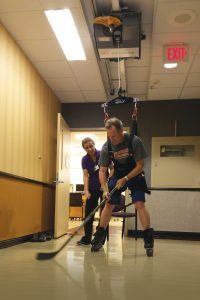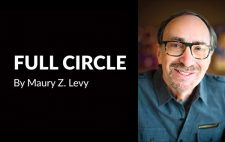Brian Propp doesn’t remember much about the night that forever changed his life.
Propp, the former National Hockey League All-Star and legendary Philadelphia Flyer, does recall that he was enjoying a relaxing evening while on vacation with his wife Kris and two children last September when he first felt the throbbing pains of a severe headache.
“The pain got worse as the night went on, but I tried to ignore it and just went to bed,” says Propp. “In the middle of the night, I woke up with the worst headache of my life. I got up to get some aspirin, but I remember feeling that my right leg and right arm were numb.”
That’s precisely when Brian’s memory of the night becomes hazy – and Kris’ becomes shockingly vivid.
“I woke up to the sound of Brian falling and slamming his face into the side of our bed. He knocked out a few teeth when he fell, which was terrifying in itself,” says Kris.
“He had never complained about any pain in all the years he played hockey, so I knew something was definitely wrong when he told me how much pain he was in. He was very out of it, but I didn’t know what was happening.”
Unbeknownst to both of them, a blood clot in Brian’s heart had dislodged and shot to the left side of his brain, causing a massive stroke. Doctors were able to determine that the clot and resulting stroke were caused by atrial fibrillation, a common heart condition Brian had been living with for years.
“Atrial fibrillation, also called AFib, is an irregular heartbeat in the upper chambers of the heart, called the atria. Because of this irregularity, not all the blood pumps out of the atria. It stagnates there, and clots can very easily form,” says Devender Akula, MD, of Lourdes Cardiology. “These clots can go anywhere in the body, but they tend to go to the brain, where they cause stroke.”
An estimated 2.7 million people in the United States are living with AFib, and roughly 20 percent of people who suffer strokes have this condition, according to the American Heart Association.
“The most common risk factors for AFib are age – the risk goes higher as we get older – high blood pressure, sleep apnea and obesity. There’s also some people who just seem genetically predisposed to AFib,” says Akula. “Left untreated, AFib causes a five-fold increased risk for stroke. Strokes from AFib are often much more severe, because the clots from the atria that travel to the brain are much larger as opposed to clots caused by plaque build-up in other areas of the heart.”
And while the risk and severity of a stroke caused by AFib is certainly frightening, there are often no warning signs until it’s too late, says Akula.
“People can go in and out of AFib quite frequently and never know it. Some people experience racing of the heart, shortness of breath or dizziness when their heart flutters or goes out of rhythm, but for others the very first symptom may be a stroke.”
Brian, who turns 57 this month, was aware of his AFib, though he admits it had been years since he had seen a cardiologist.
“My AFib was uncovered during a routine doctor’s visit years ago. I had it controlled with medicine for years, and five years ago I had an ablation, a procedure that basically puts your heart back in normal rhythm,” says Brian. “I’ve always been in good shape and felt like my heart was fine after that, so I didn’t follow up with the doctors like I should have.”
Kris also thought Brian was the picture of health in the years that followed his procedure.
“We thought he was in the clear. He never felt any pain, and he was always active and never had any problems with his heart after the ablation,” she says. “There are so many things we learned the hard way.”
The days immediately following Brian’s stroke “were tremendously overwhelming and depressing,” says Kris. “The stroke dramatically impacted his mobility on the right side of his body, as well as his speech. His right hand and right arm didn’t move at all for the first two weeks he was in the hospital. It was a traumatic time in our lives.”
Brian spent an entire month in a rehabilitation hospital in Philadelphia, where numerous hours every day were dedicated to speech, physical and occupational therapies.
“At first it was very difficult to process what had happened. It was depressing, and I was feeling sorry this happened to me,” says Brian. “I’d always been so active, so to suddenly be unable to move the way I was used to was hard. My speech wasn’t very good either, so it was hard to communicate. But I slowly started seeing progress, which was encouraging.”
The therapists also boosted Brian’s spirits by incorporating his hockey skills into his daily regimen.
“They got together and rigged a harness so I could skate around the hallways on rollerblades,” says Brian. “I kept telling myself I was lucky I could at least skate – my legs and feet weren’t affected by the stroke. They slowly helped me add stick handling to my therapy, which was tremendously uplifting.”

Therapists helped former Flyer Brian Propp regain strength and agility after he suffered a stroke by using rollerblades and stick handling
Once he was released from the hospital, Brian still had to endure another month of daily outpatient therapy sessions and yet another month with thrice-weekly appointments.
“In January I was able to cut back to two times a week with my speech and occupational therapists,” says Brian. “It’s been several months, but it’s still going to take a while to help my right hand. I keep working on my flexibility using a hockey stick, but my hand gets tired and is still weak. But I realize I am lucky because my face isn’t droopy, and I have the use of both my legs.”
Brian now also suffers from aphasia, a communication disorder that results from damage to parts of the brain that contain language. Most often caused by stroke, aphasia affects speaking, listening, reading and writing, but not intelligence.
To help with that, Brian says he’s learning to write left-handed.
“I also want to continue to improve my speaking, and Kris and I really want to raise awareness about AFib and stroke.”
Recognizing the symptoms and warning signs for stroke, says Kris, is the key to better outcomes for patients. “There is an acronym – F.A.S.T. – that is an easy way to remember the sudden signs of stroke. The letters stand for face drooping, arm weakness, speech difficulty and time to call 911. Time is of the essence for anyone you think might be suffering from a stroke.”
“Kris kept things quiet here after I had my stroke, but as news got out I had so many people wishing me well. I’ve had the support of the Flyers organization and alumni, and Eagles players all wishing me well too. That’s been really nice,” says Brian.
“But more than anything, I want to encourage people my age to get an annual check-up and talk with their doctor to see if they’re at risk, and learn the warning signs and symptoms of stroke.”














